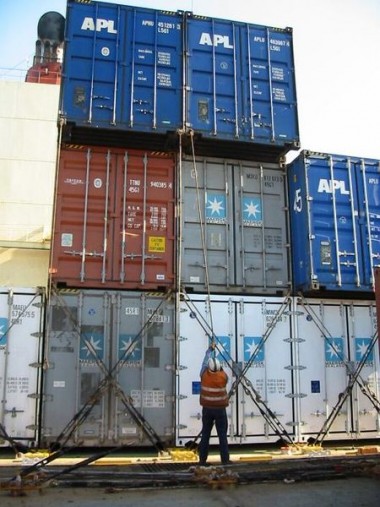
TPP, CETA present Canadian businesses with a ‘unique’ trade opportunity
by David Kennedy, Online Reporter

As worldwide trade barriers continue to fall, Canada is securing all the right partners; now Canadian firms just need to take advantage

Economists say Canadian companies need to develop a competitive advantage by recruiting skilled executives, working on market knowledge, improving innovation and building international networks. PHOTO: Danny Cornelissen, via Wikimedia Commons
TORONTO—Between the Trans-Pacific Partnership and the Comprehensive Economic and Trade Agreement between Canada and the EU, Canada’s list of free trade partners is growing long indeed.
Though still awaiting ratification or implementation, when and if these two agreements come into force, Canadian companies will be able to access markets from Southeast Asia to Central Europe virtually tariff free.
“If those two deals come to fruition… Canada will be in a hub position where we’ll have freer access to both the huge EU market, as well as the markets of the Trans-Pacific Partnership,” Danielle Goldfarb, director of the Conference Board of Canada’s Global Commerce Centre, said.
While controversy abounds in any discussion of the two blockbuster trade agreements—particularly the TPP—with detractors raising concerns about everything from the security of Canadian jobs to intellectual property rights and online censorship, Goldfarb argues the true importance of the deal is not just about being a part of it, but about the risks involved in being left out.
“What’s really important in terms of this deal, is that if Canada were not to be part of it and if the deal went through, Canadian companies would potentially have weaker access to the U.S. market than many of the other TPP countries,” she said.
“We want to at least maintain our access to the U.S. market. That’s a key reason for Canada signing on to the TPP,” she added.
While the ratification process for the TPP gets underway and CETA looks to emerge from its regulatory tangle in Europe, it’s another potential trade deal that, according to HSBC Bank Canada, would put Canada in an entirely unique position in the global trade hierarchy.
“If we also get access to China, and I would say the new government seems to be indicating that they are potentially open to free trade negotiations with China… Canada could have access to the major European economies, the U.S., the major Latin American economies [and] the major Asian economies, including Japan and China,” the bank’s Canadian chief economist, David Watt, said.

Canada’s participation in free trade agreements will allow it to maintain its access to the U.S. market while adding trading partners overseas. PHOTO: Maersk Group
“No other country has that degree of free trade partners.”
The opportunity for Canadian businesses is enormous, Watt said, but Canadian business are still going to have to work hard to take advantage.
“I don’t want Canadian businesses to be complacent, thinking, ‘well, that’s it, the U.S. is rebounding, weaker Canadian dollar, everything is fine, we can just sit back and start counting our loonies from the export gains that we’re going to be making,'” he said.
“It’s not going to be that simple. The global economy is getting smaller, the global economy is getting more competitive and if that is our view, we’re going to find ourselves 10 years down the road wondering why did we not benefit from free trade with Europe, the U.S., Japan and China.”
To take advantage of free trade, both the Conference Board and HSBC Canada think Canadian businesses need to change how they operate. Though CETA is expected to boost the country’s food and beverage, auto parts and agriculture sectors by implementing significant tariff reductions, the potential growth markets for Canada’s exporters generally lie outside the traditional manufacturing and resource sectors.
See also: Curse of the five-year plan: stay-at-home attitude putting Canadian businesses at risk
The Conference Board pointed to numerous service industries, including finance and insurance, management as well as computer and information services as potential growth areas that take advantage of Canadians’ high level of education. Agricultural products and metals and minerals did also make the think tank’s list of growth sectors, however.
Along with focusing on services, Goldfarb also highlighted how important it is that companies work to develop business in markets such as Mexico and China.

The Ambassador Bridge, a busy link between the U.S. and Canada. While the U.S. will no doubt remain Canada’s most important trade partner, economists say Canadian businesses must also look farther abroad to secure new partners. PHOTO: Starley, via Wikimedia Commons
“It will be really critical to take advantage of the newer access to Asian markets and Latin American markets,” she said.
The think tank expects Mexico and China to lead Canada’s trade growth over the next few years, followed by the U.S., the U.K. and South Korea. To take on these new and evolving markets, the Conference Board says companies should focus on recruiting skilled executives, developing intricate market knowledge, invest in innovation and tap into international networks.
Meanwhile, though HSBC Canada sees the coming years as a “unique opportunity” for Canadian firms, it also thinks the country’s businesses need to evolve.
“The fact of the matter is Canadian companies have to make dramatic changes now to the way we operate, what we produce, how we produce it [and] how we compete, in order to take advantage of what’s coming in the next few years.”